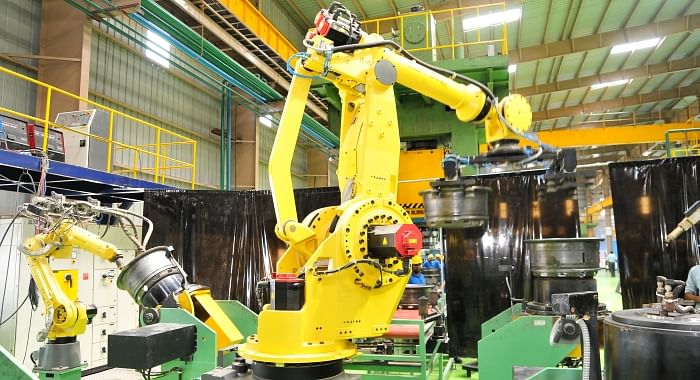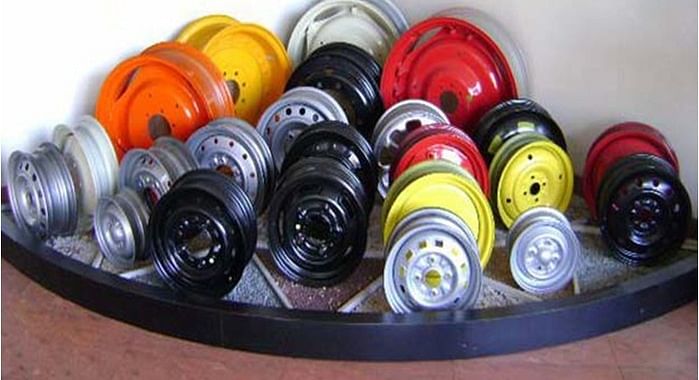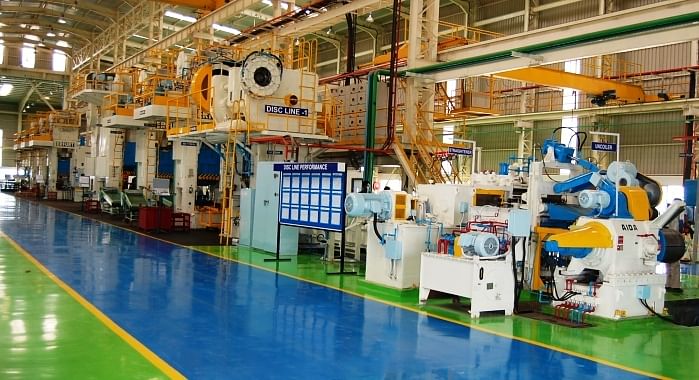Steel Strips Wheels targets heavy gains in alloy wheels
With an uptick in car volumes in India, Punjab-based Steel Strips Wheels foresees high demand for alloy wheels and is setting up a 2.5 million units per annum plant in Gujarat and also expanding operations at its Chennai plant.
With the Indian economy riding a growth curve, the automotive industry is also witnessing a revival. In expectation of the upswing, auto component makers have begun preparing for the turnaround after a subdued two years.
While some suppliers are sitting on excess capacity, others have maintained a healthy export order book to buffer placid domestic sales and are now investing in increasing capability or in new product lines. The Punjab-based Steel Strips Wheels Ltd (SSWL) is one of them.
The company is currently setting up a greenfield plant in Gujarat as well as undertaking a brownfield expansion at Chennai. New production lines for steel wheel rims are being set up to meet the growing demand from commercial vehicle customers down south as well as for driving exports from Chennai. A new plant is also to be set up at Mehsana in Gujarat, located near Maruti Suzuki’s upcoming plant as well as in the vicinity of the Ford India and the prospective Honda Cars India plants.
With its Gujarat foray, SSWL is breaking ground in alloy wheel production for the first time, thereby tapping a new segment for which it is mulling a capacity of 2.5 million units in two phases. Under phase 1, initial capacity for 1.5 million wheels per annum will be in place with the second phase adding another million wheels’ capacity. While the paint shop, to be set up in the first phase, will meet the requirements of 2.5 million wheels, the rest of the manufacturing processes will be readied for 1.5 million wheels. Once initial manufacturing is stabilised in a year and a half, the second one-million wheel capacity will be added.
The Gujarat plant sees an investment of Rs 330 crore, of which Rs 220 crore funding through loans has already been procured with Rs 110 crore to be routed through internal accruals. The Chennai expansion involves a Rs 200 crore investment over the next two years, funded partly by debt and partly by promoter’s contribution. The company maintains its EBITDA margins have been climbing northwards from 9 percent two years ago to 15 percent today.
Partners in progress
The alloy wheel plant in Gujarat is an outcome of the technical partnership inked last year between SSWL and South Korea’s Kalink Company, one of the top 10 global manufacturers of alloy wheels; Kalink has a 2 percent stake in SSWL. The plant will go on stream in June-July 2017 with mass production to commence by the third quarter of the year.
At present, construction is at an advanced stage, Mohan Joshi, head - Corporate Strategy, SSWL, confirmed to Autocar Professional. “Kalink was facing a shortfall of capacity to expand into the East Asian and Western region and was looking at supplies from Asia being cost competitive. SSWL can be that partner, using their technical capability by putting up a plant for them, manufacturing alloy wheels and then supplying it to Kalink to service demand from Europe and Asia.”
So what do the two partners bring to the table? Kalink gets on board a reliable partner and a production facility in Asia for supplying wheels to customers while SSWL acquires new technology. The technical collaboration, valid for five years, will see SSWL acquire the knowhow for design and production of alloy wheels. During this period, the South Korean partner’s stake in the company is expected to be hiked to 10-15 percent.
SSWL currently has three steel wheel manufacturing units in India, with the mother plant at Dappar in Punjab. With a production capacity of nine million wheels annually, it caters to the two-wheeler, three-wheeler, MUV, car and tractor segments. The existing plant in Chennai has six million wheels per annum capacity and makes passenger car and MUV wheels and a small number of two-wheeler wheels too.

This is SSWL's Jamshedpur plant which makes commercial vehicle wheels. Here the robotic handling conducts slow forming operations for a steel wheel.
Both plants export about 45 percent of car wheels while the third facility at Jamshedpur is dedicated to 1.8 million CV wheels manufacture, mainly for trucks and trailers in the domestic market. Due to capacity constraints, SSWL is currently unable to export CV wheels and hence the expansion of the Chennai plant to generate an additional one million wheels, increasing SSWL’s overall wheel capacity to 21 million units annually.
At present, the Chennai plant exports car wheels to the eastern and western parts of the world mainly Morocco, Romania, Kenya, Russia, Thailand, Japan and China; the company has recently bagged a new order in North America.
The CV wheels factory in Chennai will be ready within a year and will have an initial output of a million wheels with Daimler India CV being a key client. Currently, supplies to DICV are limited to 10 percent of the total as also for Volvo India due to capacity limitations. These supplies will increase as SSWL commences operations. Joshi says there is a huge demand for 15 million wheels annually for the CV segment in India and 25 million CV wheels internationally, which means a lot of potential for suppliers like SSWL.
Meanwhile, Japan and China are large markets for alloy wheels with production capacities also available in Japan and Europe for producing them but production costs have made India more price competitive, says Joshi. “As far as India is concerned, we are 40 percent cheaper than Asia in terms of cost of manufacturing which gives us a direct advantage. In addition, the Asian region is able to compete at the European level as 90-95 percent of the cars in Europe and America use alloy wheels.” Clearly, a huge opportunity awaits SSWL in alloy wheels with the challenge being cost while maintaining quality standards.
India currently imports 60-65 percent of its alloy wheel requirements from China, Indonesia, Thailand, Vietnam and Turkey but these imports attract an anti-dumping duty of 25-35 percent.
Hence, by becoming a single-source supplier with sufficient capacity, SSWL hopes to cash in on the large demand emanating from key customers like Mahindra & Mahindra, Hyundai Motor India and Maruti Suzuki India, who currently spend sizeable amounts on the anti-dumping duty in the absence of reliable suppliers in India.

SSWL is hopeful of turning a single-source supplier to Maruti, Hyundai and Mahindra.
While there are a good number of alloy wheel suppliers in India, the issue remains one of quantity and capability to cater to the domestic market with annual demand of 4.5 million wheels and expected to step up to eight million by 2019-20. Enkei Wheels India, with a one million alloy wheel capacity, is working at 100 percent capacity utilisation. Other players have small capacities of a few thousands or half a million wheels or are unable to meet quality standards. A South-based alloy wheel manufacturer is believed to be importing the wheels from its European plant. “If Maruti orders 50,000 alloy wheels per month, not many suppliers will be able to supply their complete requirements. Therefore, with OEMs moving to alloy wheels, it is becoming important for suppliers to set up capabilities with the required quality and quantity,” elaborates Joshi.
Alloy wheels, which accounted for a minuscule 5 percent in passenger cars out of the total Indian market in 2013, today cater to 22 percent. This figure is expected to rise to 32-35 percent over the next three years.
SSWL’s future growth strategy is to, therefore, capitalise and build on its alloy wheels portfolio. While fresh investments in steel wheels for cars and MUVs will slow down, more investments will flow into alloy wheels. “At present three million alloy wheels are imported by paying Rs 900-1,000 import duty per wheel every year,” reveals Joshi.
With its newly etched Korean partnership, SSWL is also gunning for large orders from Hyundai Motor India which has new launches lined up across 2017-2020. “If we bag all the RFQs for alloy wheels, then our entire Gujarat plant capacity will be sold out. The freight amount to Chennai is just 2 percent of the price of the wheel,” says Joshi.
What SSWL has on its radar is a plan to ship the alloy wheels from the Mundra Port in Gujarat to the Chennai Port where its existing plant will take care of supply chain management and de-bottlenecking operations. It will, therefore, be a win-win situation all around – for Hyundai which does not have to pay 30 percent as anti-dumping duty on the wheels and instead ends up saving 15 percent on the wheel price after paying the supplier.
What’s more, the next level of growth for SSWL in alloy wheels will come through Hyundai’s sister concern Kia Motors which is planning a foray into India and scout for a plant location in Gujarat, Andhra Pradesh and Chennai.
SSWL is also in discussions for Kia models that will be rolled out in India but nothing has been frozen yet. Kia will target the mid-sedan segment where Hyundai does not have too many competitively priced products to take on rivals. Moreover, Hyundai will thereafter be able to better focus on growing its exports from India, which opens up a vista of opportunities for SSWL.
The export growth gameplan
Estimating a year-on-year 15 percent growth in demand in India, the alloy wheel market today stands at Rs 1,600 crore per annum; along with the aftermarket, it accounts for a Rs 2,000 crore revenue.
Based on this estimate, SSWL is gunning for a 20 percent market share in alloy wheels within three years and claims it is competing on quality as it is the only player in the country to harness low pressure die casting technology that results in optimisation of raw material and extremely low rejection of output. Rivals use conventional gravity die casting technology.
The component maker has been very active globally. It recently bagged an order worth $55 million (Rs 365 crore), spread over seven years, from Elio Motors in the US for an electric vehicle. The EV, which is currently under development, will require three million wheels from SSWL and will mark the component supplier’s entry into the US car market.
Joshi says that the current focus is to supply these wheels from India but in future setting up a plant abroad could be a possibility. It is in discussions with large wheel makers in the Middle East and Europe for inking a potential joint venture and floating a JV company that could supply wheels to the US. Existing Free Trade Agreements are under the scanner for the purpose. This would eventually help curtail logistics costs but in the interregnum, supplies will be shipped from the Chennai plant to the US.

The company is also in talks with the India-bound Kia motors for the supply of wheels.
Another export order, albeit a small one, relates to Modius Motors in Kenya for an African customer which is developing a small SUV. Supplies will kickstart from next year with SSWL optimistic of adding new customers to its kitty.
Currently, SSWL exports wheels worth Rs 130-150 crore but once its alloy wheel and second CV wheel plants reach operational maturity and utilise 50 percent of the installed capacity, then a minimum addition to the export basket could be anywhere between Rs 150-160 crore by 2018-19. In terms of turnover, from the current Rs 1,500 crore, it is bullish of notching a topline of Rs 2,700-3,000 crore by end-2018-19 with its Chennai facility contributing Rs 600 crore and the first phase of the Gujarat plant pitching in with Rs 400 crore.
SSWL has also made headway in a patented technology of a single-piece steel wheel that it has been trying unsuccessfully to popularise with customers in India. Therefore, it is now targeting overseas markets for the same.
The company is bullish of recording an annual 33 percent growth in the next 3-4 years, with profitability improving commensurately. At present, though, it is on a hiring spree for engineers and designers for its alloy wheel project in Gujarat, followed by intensive training supported by its Korean partner.
RELATED ARTICLES
Inside Mahindra Last Mile Mobility’s Rs 500 Crore Modular Platform Strategy
Mahindra Last Mile Mobility has launched the UDO, an electric three-wheeler built on a new Rs 500-crore modular platform...
How the India-EU Trade Deal Could Quietly Reshape the Auto Industry
While immediate price relief for the buyer is unlikely, the India-EU FTA will help reshape long-term industry strategy, ...
Policy, Protectionism and Pressure: Inside India’s Construction Equipment Downturn
India’s construction equipment sector faces a tough battle as it takes on cheaper imports from China and a slowdown in g...






 By Shobha Mathur
By Shobha Mathur
 17 Sep 2016
17 Sep 2016
 34285 Views
34285 Views





 Shahkar Abidi
Shahkar Abidi




